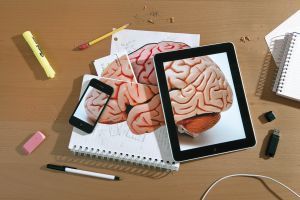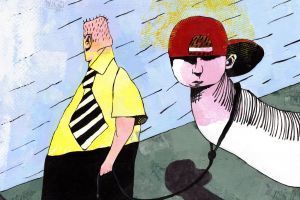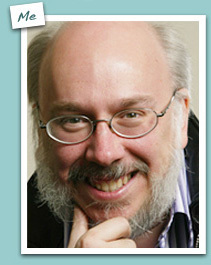 Your new post is loading...
 Your new post is loading...
"I have been practicing structured procrastination while allowing a few blog posts to, uh, ferment a bit longer (not to mention other things I want to get done). As evidence, after reading Jonah Lehrer's recent post about unstructured procrastination - Are Distractable People More Creative? - I feel inclined to write about that, rather than finish the other partially composed posts ... not to mention other important items on my todo list. But I'll postpone writing about unstructured procrastination until I write a bit about structured procrastination. Several years ago, I encountered Stanford Philosophy Professor John Perry's inspiring account of structured procrastination, which offers a more elaborate and erudite rationalization of a practice that I'd previously justified by way of British mathematician and philosopher Bertrand Russell's famous quote: The time you enjoy wasting is not wasted time."
"Attention is a key part of human cognition, and as such, attention to our environment allows us to sort out what information is important and what is not. By sorting this information into the appropriate categories we are able to become more effective at learning and decision-making within similar environments. Over the past few years video games have gained popularity as a spectator event with eSports (electronic sports) attracting numerous professional gamers and a constantly expanding global community. Yet, despite the increasing popularity and easily obtainable data, little research has been done to explore how experts and novices differ in their interaction within a complex Graphical User Interface (GUI) environment."
A complete list of benefits that have been scientifically linked to mindfulness.
"Our relationships with our SmartPhones, and this wicked habit that many of us have, of walking or driving while texting or talking, holds us in a state of perpetual inattentional blindness."

|
Suggested by
Kate Crisp
|
"In this book, we travel inside the brains of Emily and Paul as they attempt to sort the vast quantities of information they're presented with and figure out how to prioritize, organize, and act on it. Fortunately for Emily and Paul—and for readers of Your Brain at Work—they're in good hands: David Rock knows how the brain works—and more specifically, how it works in a work setting."
"Articles Below are links to some of my most popular/favorite articles: 100 Things You Should Know About People
#1 — You Have “Inattention Blindness”
#2 — You READ FASTER With a Longer Line Length But PREFER Shorter
#3 — You Can Only Remember 3 to 4 Things At a Time (The Magic Number 3 or 4)
#4 – You Imagine Things From Above And Tilted (The “Canonical Perspective”)
#5 – You Make Most of Your Decisions Unconsciously
#6 – You Reconstruct Your Memories"
"The proliferation and ease of access to information and communication technologies (ICTs) such as Facebook, text messaging, and instant messaging has resulted in ICT users being presented with more real-time streaming data than ever before. Unfortunately, this has also resulted in individuals increasingly engaging in multitasking as an information management strategy. The purpose of this study was to examine how college students multitask with ICTs and to determine the impacts of this multitasking on their college GPA. Using web survey data from a large sample of college students at one university (N = 1,839), we found that students reported spending a large amount of time using ICTs on a daily basis. Students reported frequently searching for content not related to courses, using Facebook, emailing, talking on their cell phones, and texting while doing schoolwork. Hierarchical (blocked) linear regression analyses revealed that using Facebook and texting while doing schoolwork were negatively associated with overall college GPA. Conversely, emailing was positively associated with college GPA. Engaging in Facebook use or texting while trying to complete schoolwork may tax students’ capacity for cognitive processing and preclude deeper learning, while emailing may be directly related to learning. Our research indicates that the type and purpose of ICT use matters in terms of the educational impacts of multitasking."
"Learning skills are the underlying thinking skills formally known as attention, visual/auditory processing, memory, processing, word strike and auditory analysis. Most of our children sense these skills through reading, writing, spelling, paying attention, remembering, recalling and how quick we can talk to a request. In my past few articles I have been discussing the “attention” learning skill. My past two articles discuss two of three types of attention. Specifically, I discussed divided and selective attention. Divided attention is the potential to pay attention to more than one thing at a time. Selective attention is the skill that enables us to really choose what we will pay attention to. "
"Deep attention is a goal for all of us in our lives at various times. That said, I don't believe our technologies make us any less committed to deep attention. There is no deeper attention than a coder writing code. We have such a naive and uninterrogated view of deep attention in the West because, in fact, almost all our research on attention, beginning with William James's original "Attention" chapter in 1890 (Principles of Psychology) has been focused on the form of attention interrupted by external stimuli. What 5000 years of Eastern thinking on attention tells us is that the hardest attention of all is deep attention: alone, in a meditative space, with no distractions, it is the mind that confuses itself. If it didn't we'd have a lot more Buddhas in the world! That's the profound conclusion of Eastern understandings of attention: it is hard to have deep attention and, in fact, reading doesn't even come close. Even "reading" as a category is a mish-mash. We read from different parts of the brain and in different ways when what we read is new, difficult, a re-read, a re-read of something first read in a pleasurable circumstance, a re-read of something first read in traumatic surroundings, a skim, something that must be memorized, and on and on. We call it "reading" but all those are different cognitive acts, with more or less deep attention. Given that, I dismiss simple binaries of "multitasking" as being about technology."
“In the relational (and very much of-this-world) space of attention, others, systems of others, patterns of exchange and repetition, etc., are singled out, while at the same time observed as integrated within environments of change and interrelation. In intensive observation, in close reading, in attention, the singling out and parsing of information from the chaos of presence, a recognition of patterns, structures of occurrence, ecological processes and subtle marginal points (the nuanced hues across the throat of a bird, the seasonal changes in particulate matter in a region’s air currents, fine lines webbing the surface of a woman’s face, the spreading effect of a single event or product in a market or community) can be seen as a process of setting apart—the root meaning of making ‘sacred.’…In attention we set apart the object or objects of our attention as worthy of close reading, worthy of deep observation and concern.”
"I want to suggest a different way of seeing, one that's based on multitasking our attention—not by seeing it all alone but by distributing various parts of the task among others dedicated to the same end. For most of us, this is a new pattern of attention. Multitasking is the ideal mode of the 21st century, not just because of information overload but also because our digital age was structured without anything like a central node broadcasting one stream of information that we pay attention to at a given moment. On the Internet, everything links to everything, and all of it is available all the time."
In his new book, Child’s Mind: Mindfulness Practices to Help Our Children Be More Focused, Calm and Relaxed (Parallax Press), Willard makes a case for a simpler, more grounded life, amid all the commotion. He suggests using specific mindfulness techniques to help children and teenagers pay more attention to the world around them—and maybe enjoy life a bit more.
A non-drug approach to enhance students’ ability to learn A random-assignment controlled study published today in Mind & Brain, The Journal of Psychiatry (Vol 2, No 1) found improved brain functioning and decreased symptoms of attention-deficit/hyperactivity disorder, ADHD, in students practicing the Transcendental Meditation® (TM) technique.
|
By using our attention during a mindful meditation, we are training our brain to become more and more connected to the current moment.
"If there is one general rule about the limitations of the human mind, it is that we are terrible at multitasking. The old phrase “united we stand, divided we fall” applies equally well to the mechanisms of attention as it does to a patriotic cause. When devoted to a single task, the brain excels; when several goals splinter its focus, errors become unavoidable. But clear exceptions challenge that general rule. Two weeks ago, thousands of computer game enthusiasts descended on a convention center in downtown Providence, Rhode Island, to observe some of these exceptions in action. They were attending the championships of one of the world’s hottest computer games, StarCraft 2."
"Two years ago, researchers at UCLA found that specific regions in the brains of long-term meditators were larger and had more gray matter than the brains of individuals in a control group. This suggested that meditation may indeed be good for all of us since, alas, our brains shrink naturally with age.
Now, a follow-up study suggests that people who meditate also have stronger connections between brain regions and show less age-related brain atrophy. Having stronger connections influences the ability to rapidly relay electrical signals in the brain. And significantly, these effects are evident throughout the entire brain, not just in specific areas."
"Alongside the familiar patterns of mainstream attention, there are a huge number of new patterns that could only exist in digital culture. Some of these patterns are very slow, with attention accruing over months or years, as social recommendation or small groups of fans gradually accrue around content. Some are extremely fast, synchronising audiences’ attention around a piece of culture within days, before moving on just as quickly. Some are driven by deliberate plans, orchestrated between broadcast channels and social media. Some emerge via the organic connections of lots of smaller drivers, from blogs and niche channels to SEO and twitter accounts. But, regardless of the pattern itself, the difference is that they’re Spiky – there are no technical or economic constraints keeping the spotlight in one place anymore, so attention can move on as quickly as it arrived. This is the major shift that we are missing when we are nostalgic for the 20th century. We’re only just beginning to learn what culture looks like in spiky networks, and only just beginning to invent the companies and institutions that can survive long enough to support and invest in culture in this landscape."
"Why would a former phone phreak who perseverated over the design of motherboards be interested in doing that? Using the mind to watch the mind, and ultimately to change how the mind works, is known in cognitive psychology as metacognition. Beneath the poetic cultural trappings of Buddhism, what intensive meditation offers to long-term practitioners is a kind of metacognitive hack of the human operating system (a metaphor that probably crossed Jobs’ mind at some point.) Sitting zazen offered Jobs a practical technique for upgrading the motherboard in his head."
'What does the brain do when we day dream, our mind wanders, our thoughts flit from one thing to another, or we seem to be mentally “idling”? Some evidence has accumulated during the past 30 years that implicates the involvement of an intrinsic default network in the brain: an anatomically defined network which includes the medial temporal lobe and medial prefrontal subsystems and posterior cingulate cortex. Functionally, this network supports a baseline, so-called default, mode of cortical activity that engages when externally directed thought is absent (stimulus-independent thought) and also possibly during watchfulness towards the external environment (stimulus-orientated thought). Brain activity in this default system seems to be inversely related to activity in another intrinsic network, the “attention system”, which is activated during goal-directed cognition. These networks have been explored mainly using brain imaging, but—though at first sight incongruous—could doodles, and the doodling that produces them, provide another way of probing the default network and the brain functions it supports? Although of enduring interest to the public and to teachers, psychologists, psychiatrists, and many in the humanities, doodles have received little attention from neuroscientists. Because of the circumstances in which they are often produced, however, doodles and doodling might reveal insights about how the brain functions, notably when in “idling” mode."
"This scarcity of attention is certainly an issue with today's media-multitasking students. A study released in January 2010 by the Kaiser Family Foundation found that total media exposure per day for young people ages 13 to 18 increased from 7 hours and 29 minutes in 1999 to 10 hours and 45 minutes in 2009. Use per medium increased, but the largest increase was time spent multitasking."

|
Suggested by
Ken Morrison
|
"In 2005, Wendy Griswold, Terry McDonnell, and Nathan Wright, sociologists from Northwestern University, published a paper concluding that while there was a period in which extraordinarily many Americans practiced long-form reading, whether they liked it or not, that period was indeed extraordinary and not sustainable in the long run. "We are now seeing such reading return to its former social base: a self-perpetuating minority that we shall call the reading class."
The survey asked questions about how many hours per average day the respondent participates in one of those media, whether they engage in different media at the same time, and how they feel while they’re engaging in each of these medium about the number of friends they have, their feelings of normalcy, whether they sense peer pressure, and how much sleep they get.
Via DML Competition
"The ability to do one thing on autopilot while doing something else is referred to as automaticity. While experienced drivers can hold conversations and listen to the radio while driving, novice drivers cannot. Indeed, many new drivers turn off the radio and ask passengers not to talk to them. They also don’t make phone calls or try to send text messages. Automaticity does not mean that distractions – while driving or otherwise – do not have an impact. Brain scans by neuroscientists studying this issue have shown that the brain has difficulty paying attention to sights and sounds at the same time. If the brain is focused on a visual task, its ability to handle an auditory task decreases markedly, and vice versa."
So, I think that the narratives we use to think about our students multi-tasking in class needs to be informed by the nature of what it is to absorb oneself in digital media. Beyond this, I am persuaded by the research that suggests that when we multi-task, our performance degrades for each task we multi-task, even as we receive a neurochemical reward for our multi-tasking. So, through no fault of our own, our biology has us feeling better and better even as we do worse and worse.
Like all skills, mindfulness requires practice. The rationale behind practicing any skill is that you will gain valuable knowledge and insight. The same is true for practicing mindfulness. While there is no “one way” of practicing mindfulness, there are some general guidelines for beginning to meet your experience with yourself and others from a centered place of mindful intention.
|



 Your new post is loading...
Your new post is loading...












![How a Computer Game is Reinventing the Science of Expertise [Video] | Observations, Scientific American Blog Network | attention | Scoop.it](https://img.scoop.it/TQl5sMBxCF9mrxwxyAkKfjl72eJkfbmt4t8yenImKBVvK0kTmF0xjctABnaLJIm9)












